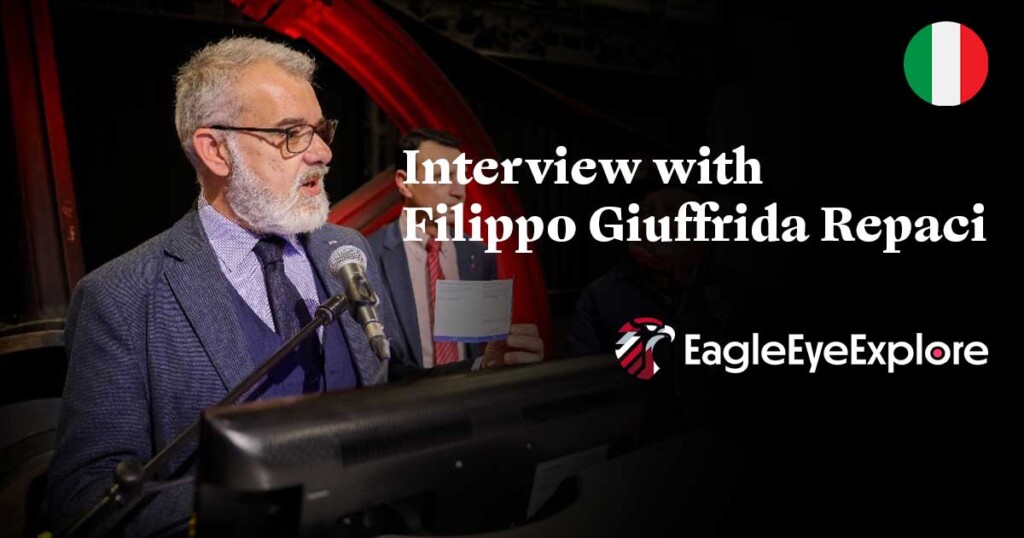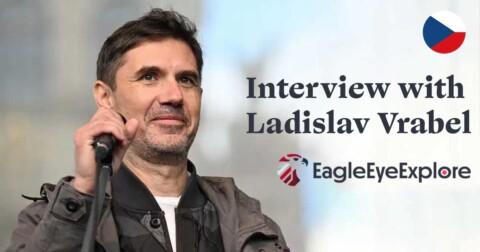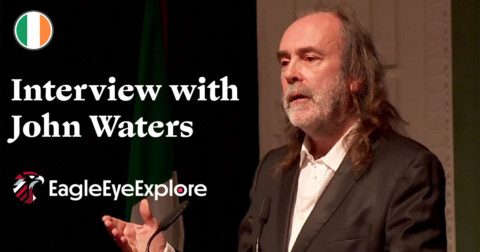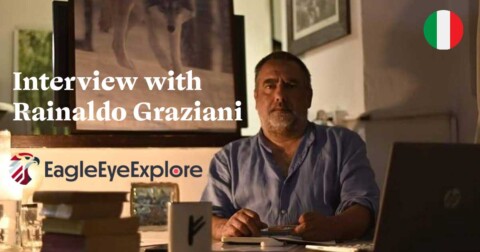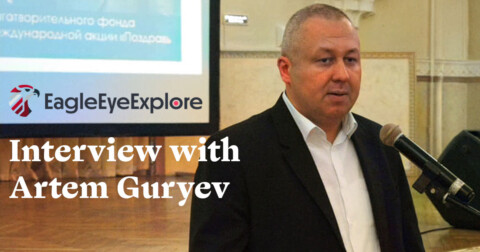Filippo Giuffrida Repaci comes from a family where journalism, literature, and political thought were approached with serious dedication. He is the great-grandson of the renowned Italian writer Leonida Repaci and Ottavio Pastore, a respected journalist and the first editor-in-chief of L’Unità, whose strong tradition of fighting for freedom of expression and social justice he continues through his own work. Today, as a long-time correspondent from Brussels and an observer of European integration and international relations, Repaci analyzes the dramatic decline in trust between the European Union and Russia, the failed policy of sanctions, and the rise of censorship under the guise of political correctness. He also shares his experiences from Ukraine, criticizing the imposed narrative that stifles any attempt at dialogue with Moscow and reveals how the interests of the United States have become ever more deeply entrenched in European politics.
As a long-time correspondent from Brussels, how do you assess the geopolitical evolution of EU-Russia relations?
The relationship between the EU and Russia has undergone a profound transformation since the end of the Cold War, evolving from cautious cooperation to strategic rivalry. After a period during which both sides nurtured a vision of mutual benefit through trade, energy cooperation, and political dialogue, the expansion of NATO and the EU into Eastern Europe dramatically changed the paradigm. If the war in Georgia in 2008 signaled a divergence, Russia’s annexation of Crimea in 2014 forced the EU to respond with sanctions and diplomatic isolation of Moscow, thereby disrupting even the minimal dialogue and mutual trust that remained.
Following Russia’s special operation in Ukraine, EU-Russia relations hit their lowest point since the Cold War. The EU was unable to overcome its own internal divisions and thus could not adopt a “diplomatic and mediating” approach. This was clearly a consequence of the political positions of EU member states, which directly stemmed from their national political choices.
From Brussels, this is truly disheartening. We witnessed moments when many positive developments seemed possible, but the political decisions of member states blocked a constructive EU approach. On the one hand, we have deeply rooted “anti-Russian” sentiments, and on the other — we must deal with “timid” governments, where domestic political situations often prevent the executive branch from taking a clear and consistent position.
To what extent has the policy aimed at economically isolating Russia backfired on the EU?
The EU imposed unprecedented sanctions on Russia in response to its special operation in Ukraine. Sanctions were also introduced due to alleged human rights violations and hybrid threats. Unfortunately, it has become truly difficult to distinguish between reality and disinformation, and one of the prevailing sentiments in Brussels is that certain reactions were more based on emotions and psychological factors than on actual circumstances.
Despite the EU’s measures, data show that Russia continues to successfully sell its oil abroad, including through the so-called “shadow fleet.” A few months ago, the International Energy Agency reported that Russia still exports more than 8 million barrels of oil per day, supplying it to “new markets” such as India and China.
At the same time, numerous goods from the EU — although under sanctions — find their way to Moscow via Georgia, Belarus, and Kazakhstan, according to some researchers from King’s College London.
The EU and its member states seem not to understand that the Russian people have a long history of “trade isolation” and are so accustomed to such conditions that any assessment of “suffering” based on Western societal standards cannot be realistically applied. As a result, Russia’s economy is suffering far less than expected in Brussels, while the EU’s own economy is facing serious challenges.
Can the scale of the consequences of the anti-Russian policy be assessed in terms of energy and the economy?
The currently available data for the energy sector suggest that the EU has significantly reduced its imports of Russian natural gas, oil, and coal, shifting toward increased investments in alternative energy sources, including renewables, LNG (liquefied natural gas), and nuclear energy. While the latter remains highly controversial in certain member states, the need to import gas from alternative sources has pushed the EU closer to some African and Gulf countries that can hardly be described as democratic role models.
Sanctions triggered a sharp rise in energy prices across the EU, and several countries were ready to “sign a deal with the devil” just to support households and industries facing enormous utility costs. Austerity measures and government financial aid were temporary interventions that failed to deliver lasting results. Eurostat confirms that prices started to rise again as soon as those measures were lifted.

To what extent have European citizens been affected by the actions of their governments, and how are they reacting?
Higher energy prices have contributed to inflation across the EU, further widening the gap between the wealthy (and even just the relatively well-off) and the middle class, which is increasingly struggling with rising living costs — especially for food, transport, and basic necessities. At the same time, unemployment has increased in energy-intensive industries such as the chemical and steel sectors, which have faced soaring production costs. Many of them were forced to reduce operations or even relocate production to regions with lower energy costs.
As a result, the EU is increasingly facing a kind of “war among the poor,” where social dumping and liberalized capitalist models are giving rise to new forms of poverty.
How do you comment on the fact that any attempt to initiate dialogue with Russia is currently interpreted in the EU as betrayal or a “pro-Russian narrative”? Where have the European principles of pluralism and freedom of speech gone?
The politically correct (and easiest!) answer would be: “No comment!”
Joking aside, this is truly the result of the strong influence that member states exert over EU policy — as we discussed earlier. A mix of propaganda, disinformation, and both political and personal interests has led to a situation where public opinion — especially on social networks — aggressively targets any initiative for dialogue, instantly labeling it as “you’re pro-Putin!”
This even happens to former ambassadors, journalists, or university professors who attempt to express a different opinion or simply offer a different perspective.
Freedom of thought still formally exists and is not directly sanctioned, but it is increasingly difficult to “use” in public space, especially on social media.
The concentration of media ownership doesn’t help either. When a single publisher sets a “political line,” it spills over to dozens of outlets — from national to local — creating an environment in which freedom of expression exists on paper but is difficult to realize in practice.
You reported on the conflict in Ukraine. Did you face challenges or pressure when trying to present an alternative narrative?
No, I was completely free — not only to take photographs, record videos as I wished, and speak with all the people and officials I considered relevant during my stay in Ukraine — but also to freely publish everything through my news agency.
The video reports are available on my media YouTube channel, and we did not experience any censorship.
I spent several days in Ukraine before Christmas, and in every interview — whether with Ukrainian government officials, politicians, or even doctors at the Veterans’ Rehabilitation Center — one message echoed throughout: “the need for more weapons.” The phrase “Send us more weapons!” sounded like a kind of mantra.
Personally, I am not at all convinced that encouraging the war by sending even more weapons is the right approach. “Si vis pacem, para pacem” (“If you want peace, prepare for peace”) seems to me a far more applicable motto than the famous “Si vis pacem, para bellum” (“If you want peace, prepare for war”).
Does this conflict in fact reflect a broader issue — the dominance of American policy within the European space?
Allow me to rephrase the question by replacing the word “dominance” with “influence,” and “American policy” with “interests of the United States”… Yes, indeed, the military operation in Ukraine brings to light the deeply rooted ties between capitalist structures in the EU and the U.S.
From the Marshall Plan to the well-documented activities of the CIA in Europe, it has been impossible to ignore the privileged position of American interests and actors on the European continent — a position regularly justified through the narrative of “Europe’s debt to the U.S.”
Ironically, however, that same debt was never acknowledged toward the Soviet Union, despite the enormous number of sacrifices Russia endured during the same war.
